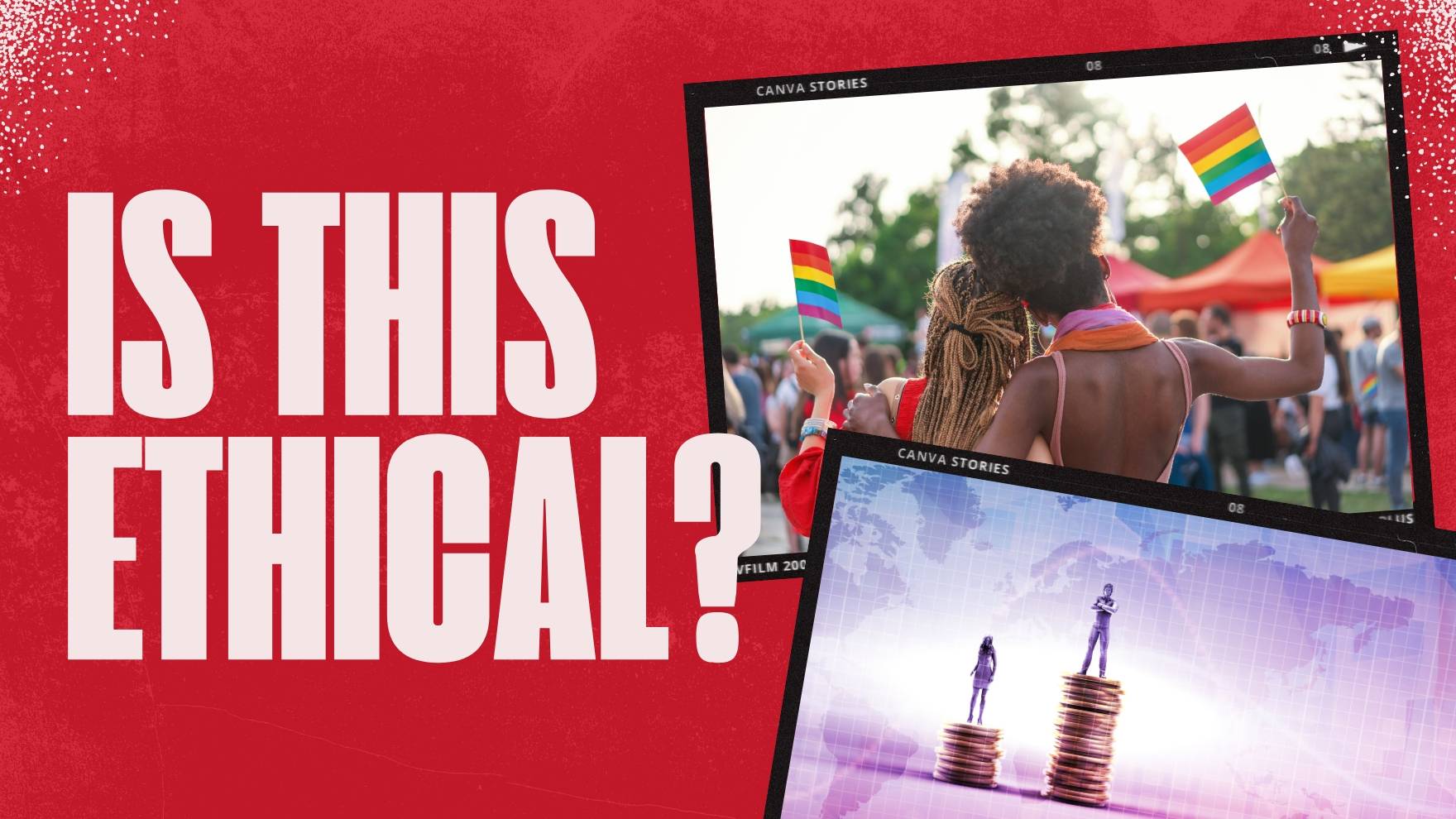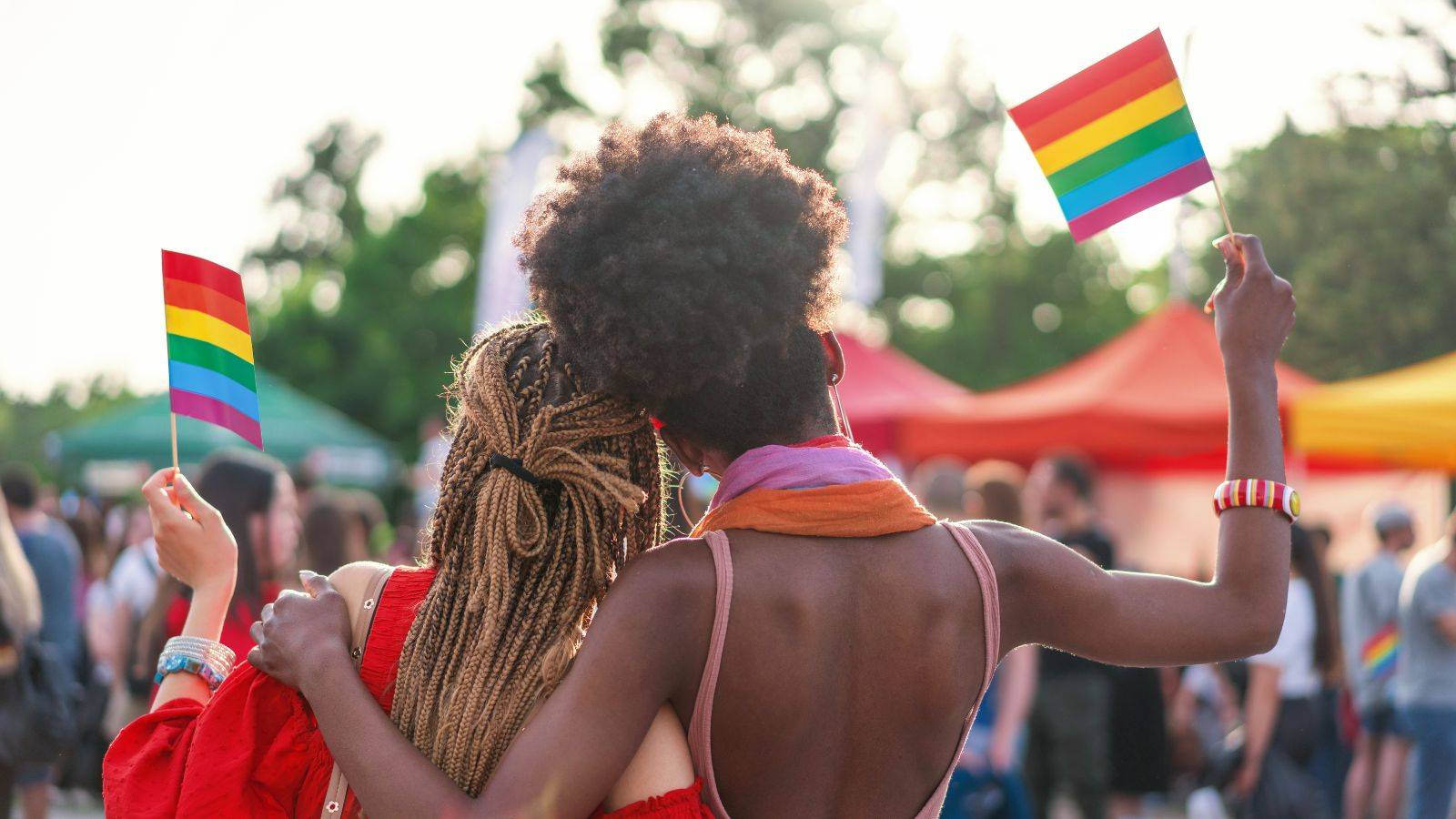Ethan Jong • Published May 2, 2024

Most Americans today believe in the importance of using ethical business practices to grow and scale an organization. But how many companies are really considered “ethical”? And what constitutes an “ethical” business?
Some of the issues that America has seen over recent times are the wage gap between marginalized groups and non-marginalized groups, workplace discrimination, sex discrimination, and a lack of an attempt to build a diverse community among corporations.
But America has many great positives to their economic and societal environments. The NGLCC (National Gay & Lesbian Chamber of Commerce) is one of a handful of organizations helping to raise awareness for LGBTQ+ workers and their organizations.
In this article you’ll learn more about how America’s workplace environment is shifting with the times, and how the NGLCC is helping to mitigate and prevent LGBTQ+ workers from facing further employment discrimination.
Key Takeaways
- Many Americans believe in the importance of ethical business practices, but most believe that many businesses are not following ethical business practices.
- Americans face many issues in the workplace that are having negative impacts on the LGBTQ+ community.
- The NGLCC is a driving force for the advocacy of LGBTQ+ workplace equality.
Just how Ethical are some American Companies?
The reality of how ethical some American companies are extends far beyond the scope of media attention. Behind the curtains, when the lights are off, and nobody is around, some companies can get away with sneaky practices that most would deem as unethical and troublesome for both society and the economy. But what specific business practices are some of these companies engaging in, and why may they be deemed unethical?
Pay Inequalities

Most people are aware of the gender pay gap that exists between men and women. That women earn on average $0.71 cents per dollar that a man would make. Or that women will earn on average 16-18% less than a man. But what about the pay gap between LGBTQ+ workers and non-LGBTQ+ employees?
According to this survey conducted by the Human Rights Campaign Foundation of almost 7,000 LGBTQ+ full-time workers, median earnings were a reported 10% less than non-LGBTQ+ employees. The survey showed a median earning of about $900/week for LGBTQ+ workers, while non-LGBTQ+ employees saw median earnings of about $1,000/week.
This evident wage gap between LGBTQ+ full-time workers and non-LGBTQ+ employees is a prime example of how some companies may mistreat their employees. The result of such mistreatment can lead to the degradation of financial well-being for members of the LGBTQ+ community. Wage gaps like these should be carefully tracked and reported to ensure that everyone is aware of the injustice that is being acted out. One way to fight this is complete financial pay transparency within an organization with set hire amounts and benchmark raises for everyone to see.
Lack of Diversity and Underrepresentation
About 5.1% of US women identify as being part of the LGBTQ+ community, and 3.9% for men. The rate at which American LGBTQ+ women (barely) move up the corporate ladder is shocking, and much more severe and apparent than the movement of American LGBTQ+ men in corporate hierarchies.
LGBTQ+ women will make up about 2.3% of entry-level positions in America, which is already exceedingly lower than the aforementioned 5.1% figure that represents the total percentage of US LGBTQ+ women. The statistic only gets worse from here, sadly.
By the time LGBTQ+ women are promoted to senior manager and director roles, LGBTQ+ women make up only about 1.2% of the workforce at that respective level. Just 0.6% of SVP and c-suite roles are handed out to LGBTQ+ women.
What is likely occurring is that LGBTQ+ women who are more than capable enough to perform a certain role, are being passed over for promotions and hiring on the basis of sexual orientation and gender identity.
The result of these poor hiring and promotion practices is that companies can develop homogenous employee populations that promote groupthink, and reduce the set of diverse perspectives. If companies want to excel in today’s highly competitive and diverse market, they need to reorient their priorities in relation to inclusion and equality in the workplace.
Workplace Discrimination - Gender Identity
According to a 2021 report conducted by the Williams Institute, almost more than half of all LGBTQ+ workers have faced some form of unfair treatment at some point in their careers. There are multiple ways in which LGBTQ+ workers can experience unfair treatment or harassment in the workplace.
One such way is through the misuse of inclusive language. Transgender employees may prefer to have different pronouns from the ones that were assigned to them at birth. If transgender men prefer to go by the pronouns he/him, and their colleagues consistently use she/her pronouns to their face instead, then the transgender men have been harassed based on their sexual orientation and gender identity.
In another article I wrote, I discussed how AI has the power to misgender not only transgender folks but anyone who considers themselves part of the LGBTQ+ community. The effects of misgendering as a form of harassment can be truly devastating towards one’s mental health.
The trend in mental health of the LGBTQ+ community in America is not one to be proud of. According to a 2022 national survey, the rate of suicidal thoughts has trended upwards among young LGBTQ+ people over the last three years preceding the survey. Part of this trend can likely be attributed to microaggressions and harassment occurring within the workplace.
What are Federal Agencies doing to Prevent Workplace Harassment against LGBTQ+ Employees?
So now that we are aware of some of the ways in which companies may be unethical towards the LGBTQ+ community, we can begin to wonder what the federal government is doing to stop and prevent such atrocities from taking place.
To grasp a better sense of today’s social LGBTQ+ climate and the government, we must first backtrack to a historic moment in US history that sparked the movement for LGBTQ+ equality across America.
1969 Stonewall Uprising
Back in 1969, the Stonewall Uprising took place in New York. The New York Police Department stormed into the Stonewall Inn – an LGBTQ+ bar – and aggressively hauled out and arrested multiple LGBTQ+ people without cause.
This was not an isolated case of discrimination that the LGBTQ+ communities faced. LGBTQ+ run establishments had been raided unexpectedly and unjustifiably many times before. What ensued was a historic multi-day riot that served as a wake-up call for federal agencies to make better efforts to abide by the law, or in some cases, change the law.
The Creation of Pride Month

They say that for every adversity, there comes an opportunity. In the following years after the Stonewall Riots, communities across America began celebrating the anniversary of the Stonewall Riots on June 28.
The commemoration of the Stonewall Riots on June 28 eventually transformed into what we now refer to as Pride Month. Today, the Pride parade boasts millions of attendees annually and has become a hallmark event to attend that has also spread across the world to many other cities and countries.
In 2019 An estimated five million people attended events in Manhattan during the final weekend of WorldPride NYC alone, making it the largest LGBT pride event ever held and it marked the 50-year anniversary of the original Stonewall Riots.
Supreme Court Amicus Brief - Civil Rights Act
In 2013, Gerald Bostock was fired from his company when he joined a gay softball team. Bostock filed a lawsuit against his company, Clayton County, on the basis that he was fired due to his sexual orientation and gender identity.
In 2020, the Supreme Court issued a landmark ruling regarding Title VII of the Civil Rights Act. Title VII of the Civil Rights Act disallows employment discrimination based on race, colour, religion, sex, and national origin. The controversy arose from whether “sex discrimination” would include discrimination related to sexual orientation.
In a 6-3 ruling, the Supreme Court issued that Title VII of the Civil Rights Act would be interpreted to view discrimination based on sexual orientation as discrimination related to sex.
That same year, a record-breaking 206 large corporations signed an amicus brief that would back the decision made by the court to protect LGBTQ+ workers who face discrimination in the workplace.
Equality Act - Proposed Amendments to Civil Rights
While the Supreme Court did rule for Title VII of the Civil Rights Act to cover discrimination based on sexual orientation, some courts across America were still not in agreement with the added sexual orientation interpretation.
Advocates realized that until sexual orientation discrimination was fully recognized by the law as unjust, there would always be some tolerance for discrimination against LGBTQ+ workers. Advocates wanted to create a world where there was no doubt in the court of law that sexual orientation discrimination would be illegal.
This is one of the reasons for the new proposal of the Equality Act by lawmakers across the US. The Equality Act proposes various amendments to multiple civil rights, including Title VII of the Civil Rights Act.
If passed, the LGBTQ+ community would receive multiple benefits and support from courts of law across America. America would be one step closer to achieving equity and inclusion for employees and workers alike.
How US Federal Agencies are Failing Transgender People
Despite some of the recent positive trends in the US court of law, the LGBTQ+ community still faces many hurdles. Transgender people have faced much resistance in the past few years in regard to bills and legislation.
In 2023, a bombardment of bills relating to transgender adults were introduced with the hope of being passed. Such bills included topics pertaining to restrictions on gender-affirming care, bathroom use, education, and drag performances.
On May 8, 2023, North Dakota Governor Doug Burgum signed a bill that now allows public school teachers and state government employees to ignore the pronouns that their students and workers prefer.
In effect, transgender people would be misgendered on a recurring basis which could lead to the development of mental illness down the road. Transgender women who self-identify as a woman and may prefer the pronouns she/her, may be misgendered by their co-workers. The same would be true for all transgender people who use a pronoun that is different from their biological sex at birth.
The implications of this bill would extend beyond the realm of transgender people. Non-binary individuals, who may also fall into the category of transgender at times, may prefer to use pronouns like they/them, ze/hir, and xe/xem.
But, given that gender identities are not always easily identifiable by simply taking a glance at someone, non-binary workers may face discrimination from having their gender identity assumed and assigned by other people. Other people that now have the right to freely assign whatever gender identity they would like to a non-binary person under this bill.
Luckily, there are champions and heroes like the NGLCC who can use their power and prowess to advocate and support LGBTQ+ communities across America.
NGLCC Certification and the Fight for Inclusion and Equity
The NGLCC provides certification to LGBTQ+ businesses that qualify for their LGBTBE Certification. This certification plays an essential role in the development and protection of LGBTQ+ employees and employers.
Being LGBTBE certified by the NGLCC provides a whole host of benefits. Some ways that the NGLCC provides support to LGBTBE businesses include:
- Eligibility to showcase your business at the annual NGLCC International Business and Leadership Conference.
- Access to receive sourcing opportunities from both the NGLCC and their corporate partners.
- Access to join exclusive mentorship programs, leadership training, and scholarship opportunities provided by the NGLCC and their corporate partners.
- Recognition from some of America’s largest companies as a Certified LGBT Business Enterprise® supplier.
- Discounts and offers from various organizations.
- Access to receive support from the Transgender & Gender Expansive (TGX) Initiative (for TGX-owned businesses only)
- Opportunity to receive support from the Communities of Colour Initiative (CoCi) (for business owners of colour only)
- Permission to use the NGLCC Certified Business logo on any of your marketing materials.
By certifying your business through the NGLCC, you increase your chances of achieving and maintaining economic security, future employment, and equity in the workplace.
The LGBTBE certification acts as a label to express to other consumers, companies, and governments that unfair treatment will not be tolerated, that inclusion of all workers is respected and expected, and that the LGBTBE-certified business is proud to be LGBTQ+ owned.
The National LGBT+ Chamber of Commerce has made immense advocacy efforts for the rights of LGBTQ+ people in the workplace.
The NGLCC is constantly meeting with legislators and government officials across the board to ensure that the LGBTQ+ community has a voice not just during Pride month, but all year round.
The NGLCC has partnered with several domestic partners as part of their advocacy efforts. Some partners include and are not limited to:
- The U.S. Small Business Administration.
- The U.S. Department of Commerce.
- The U.S. Department of Labor.
- The U.S. Department of Agriculture.
In partnership with these organizations, the NGLCC advocates on topics like the wage gap, employment discrimination, the lack of diverse communities in the workplace, and more.
Summary
Most Americans truly value the importance of having ethical business practices across corporations. Most Americans envision a world where corporations treat everyone fairly and equally. In fact, over 80% of Americans believe that businesses making money in ethical ways and compensating workers fairly is extremely important, but less than one-third believe that businesses are doing both. But the state of today’s corporate world shows otherwise.
But slowly, the corporate world is beginning to take a new form. A form that is willing to open up to the acceptance and welcoming of LGBTQ+ workers. A form that includes full-time workers within the LGBTQ+ community, instead of excluding them. A form that is fluid, flexible, and can learn to stray away from traditional and old-age ideologies that have served their time.
The LGBTQ+ community has undergone multiple attacks. From the Stonewall Riots in 1969, the LGBTQ+ wage gap that exists today, to the North Dakota gender identity bills, there is still much left to conquer in the realm of equity and inclusion for LGBTQ+ workers.
Thankfully, work is being done to amend these systemic issues. With the Bostock v. Clayton County win proving to be a huge milestone for the inclusion of LGBTQ+ people in the Civil Rights Act, to the newly proposed amendments to the Civil Rights Act, there is hope for LGBTQ+ communities across America.
In addition to government work being performed, the NGLCC is proving to be a powerhouse in the advocacy for LGBTQ+ people. Together with the NGLCC, LGBTQ+ activists, and allies across the US, major societal reform is truly a possibility.
FAQs
LGBT businesses must be at least 51% owned, operated, managed, and controlled by an LGBT person or persons who are either U.S. citizens or lawful permanent residents.
No country has yet to close the gender wage gap completely, but some countries have gotten close. Some countries that are progressively closing their gender wage gaps include Iceland, Norway, Finland, New Zealand, and Sweden.
Here are three ways in which anyone can support an LGBTQ+ coworker:
- Avoid Assumptions
- Use Inclusive Language
- Stand up to discrimination and harassment

